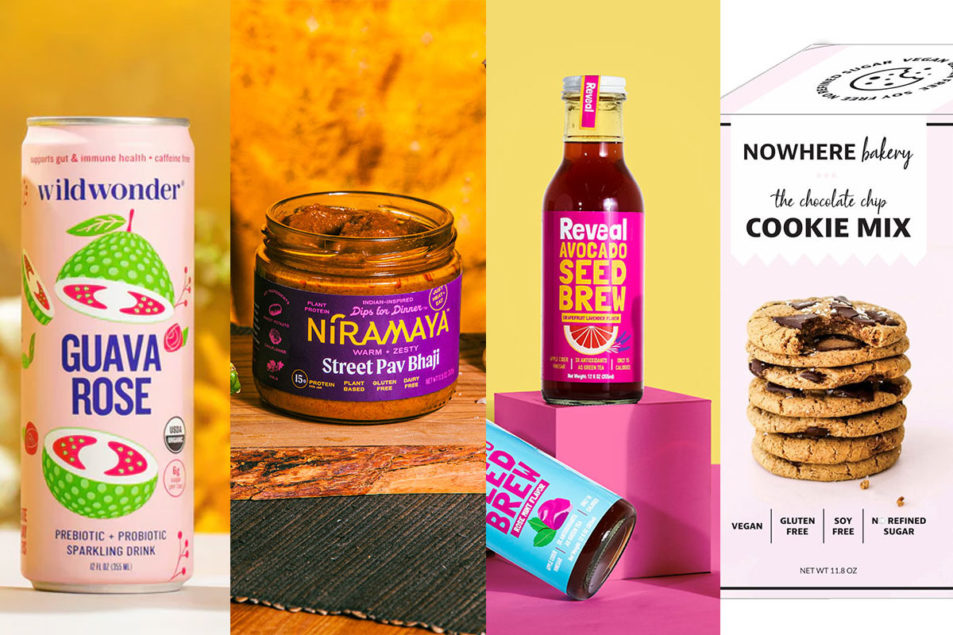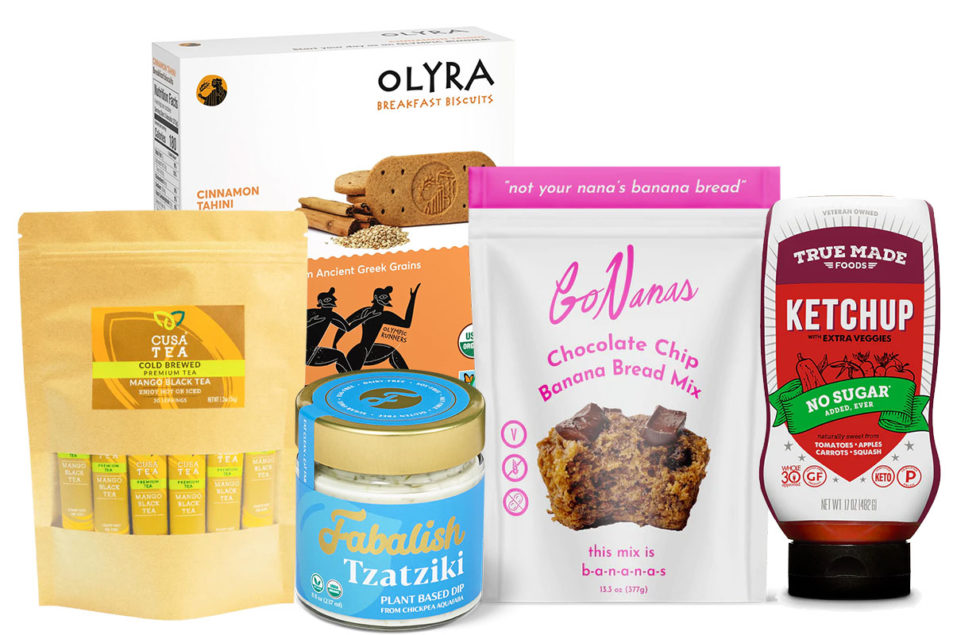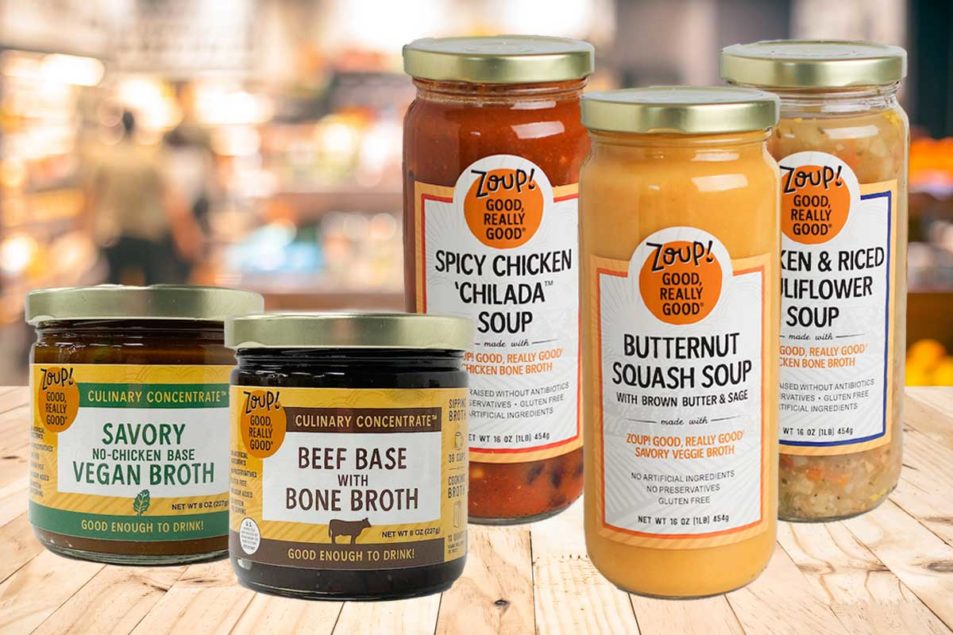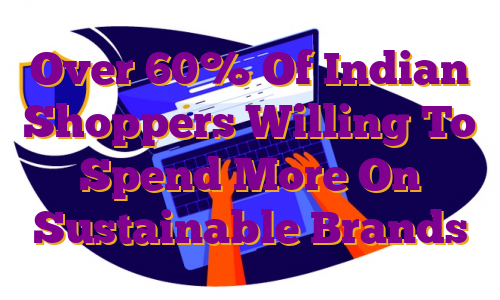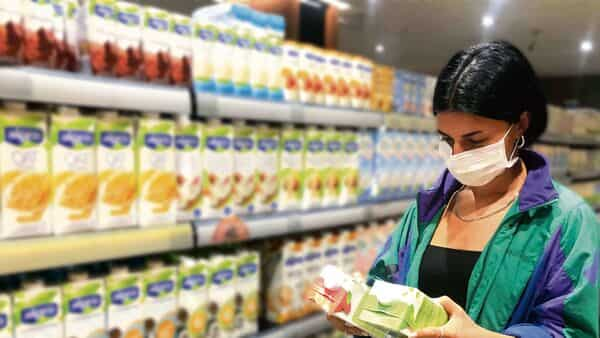SAN FRANCISCO — Fourteen emerging brands were recognized during the second annual Shelfies Awards ceremony, held Sept. 14 and hosted by Startup CPG, an organization dedicated to supporting early-stage entrepreneurs.More than 300 brands submitted over 600 food and beverage products. Forty-one finalists were selected across 13 categories. Products were judged on taste, innovation, mission and branding.Founded in 2019, Startup CPG provides free resources, services and networking opportunities, connecting founders and industry partners at live and virtual events and on digital platforms.“Since our inception, we have been keenly attentive to the unique challenges and opportunities that small emerging CPG brands face,” said Jenna Movsowitz, head of marketing and editor of “The Spotlight” at Startup CPG. “Among these challenges is the cost and labor barrier to nominating products for big-name awards. Yet the recognition of a best-in-class award could be the catalyst to turn an emerging product into a moonshot.”The winners of the 2022 Shelfies Awards are:Best international flavors: Niramaya Foods offers a collection of Indian-inspired, plant-based dips, including masala tomato sabji, super greens saag and street pav bhaji. The versatile dips may be paired with chips as a snack or served with rice and vegetables to create a balanced dinner, according to the company.Best snack: Fun-Gal Snacks is the maker of Popadelics, a brand of crunchy mushroom crisps with culinary-driven flavors, such as rosemary and salt and truffle Parmesan. A portion of sales supports health and wellness causes.Best breakfast food: For Good Granola is a chef-created, no-oat granola based on buckwheat groats, which is rich in vitamins, minerals and protein, plus nuts, seeds, dried fruits and puffed amaranth and sorghum. The startup supports organizations empowering children and adults with disabilities.Best kids’ product: Tiny Sprouts Foods is a children’s nutrition company committed to producing convenient, functional products with organic ingredients and no added sugar, preservatives or artificial flavors. The brand’s core product line features seeds such as chia, flax and hemp, plus probiotics and vitamin D, and may be sprinkled, mixed or baked into a variety of foods.Best baked good: Nowhere Bakery bakes premium cookies, brownies and bars formulated with almond flour, almond butter, organic coconut sugar, organic maple syrup and organic coconut oil. All products are plant-based and free from gluten and soy.Best alcohol beverage: G’s Hard Ginger Beer markets a range of organic, low-alcohol ginger beers that are fermented dry and contain no added sugars, sweeteners or artificial ingredients. The canned cocktails are available in flavors including ginger, lemon and orange; ginger, mint and lime; and ginger, passionfruit, orange and sea salt.Best condiment: AWSM Sauce is pioneering powdered mixes for classic condiments including ketchup, barbecue sauce and hot sauce as a sustainable alternative to conventional bottled options. The brand’s patent-pending ”powder-to-pour” technology helps reduce single-use plastic packaging waste.Best supplement: Two brands tied in the supplement category. Gwella recently launched its Mojo Microdose line of gummies made with a proprietary blend of functional mushrooms, herbs and roots to support energy, focus, clarity and mood. Hone offers a coffee alternative made with matcha and mushrooms to deliver benefits including immunity, energy and focus.Best sustainability-focused product: Hidden Gems has developed a proprietary process to create Reveal Avocado Seed Brew, a ready-to-drink beverage with three times more antioxidants than green tea, plus prebiotics for gut health. Flavors include grapefruit lavender, mango ginger and rose mint.Best plant-based product: Funky Mello’s plant-based marshmallow cremes are formulated with aquafaba, the starchy brine of cooked or canned chickpeas, plus sugar, tapioca syrup, vanilla flavoring and sea salt. The brand is carving out a new category in refrigerated desserts with a versatile fluff that spreads, swirls, melts and more.Best frozen product: Balkan Bites is a maker of frozen appetizers featuring Southeast European comfort foods, such as burek, a savory hand pie with a flaky, phyllo crust.Best beverage innovation: Wildwonder is a beverage brand focused on digestive health. Its low-sugar, sparkling tonics combine prebiotics and probiotics, with flavors ranging from guava rose to peach ginger to strawberry passion.Best branding: Uproot Teas is a direct-trade, premium tea startup, partnering with family farms in Hawaii, Vermont and Kyoto, Japan, to source sustainably grown whole leaf tea.Carl Starkey, co-founder of AWSM Sauce, said the award represents a “major validating step” for the brand.“To start a brand a year ago as two dads with a vision and now be a Shelfie Award winner is wild,” he said.Saphira Rasti, founder and head baker of Nowhere Bakery, added, “It is an honor to be acknowledged for the work we are doing. We have bragging rights.” .
Five emerging brands to participate in Brandjectory Pitch Slam
BATTLE CREEK, MICH. — Five emerging brands were selected to participate in a pitch competition produced by Brandjectory, an online platform dedicated to connecting early-stage consumer products entrepreneurs to investors.The virtual, two-hour event will be held on Sept. 14 and is free to attend. More than $95,000 in cash and services will be awarded, including a $20,000 cash prize for the winner. Co-hosting the event are Jessi Frietag, Startup CPG podcast host and independent consumer packaged goods operations consultant, and Wade Yenny, director of grocery, dairy and frozen at The Fresh Market. An afterparty will feature Jake Karls, co-founder of Mid-Day Squares.The inaugural Brandjectory Pitch Slam finalists are:Cusa Tea & Coffee, a brand of premium instant teas and coffees;Fabalish, a maker of snacks and dips formulated with chickpea ingredients;GoNanas, a producer of allergen-free banana bread mixes;Olyra, a brand of organic breakfast biscuits featuring ancient grains; andTrue Made Foods, a creator of no-sugar condiments sweetened with fruits and vegetables.“These are exceptional founders and business propositions,” said Tom Malengo, co-founder of Brandjectory. “We are excited to offer the first of many pitch slams for the industry. It’s a chance for us to showcase just five of the sensational brands on our platform.”Applications were open to Brandjectory premium subscribers. All applicants received feedback from investors, and the five finalists will receive investor coaching prior to the event, according to Brandjectory. A panel of six investors will determine a winner during the competition.Founded by three industry veterans, Brandjectory provides access to business education, networking opportunities and one-on-one coaching with investors and experts to startup founders seeking seed capital. Since its launch, Brandjectory has facilitated more than 1,400 connections between founders and investors. A year ago, Brandjectory added the premium membership service with benefits including invitations to all Brandjectory events and meet-ups; participation in coaching and mentoring with investors, buyers, brand marketers, product segment experts and more; a founder-only discussion forum; access to hundreds of articles from experts and partners; and brand exposure to a community of hundreds of investors.Startup founders may learn more or register for a premium membership at brandjectorynow.com. Attendees may register for the Brandjectory Pitch Slam at bit.ly/3QfVNFL. .
Inside Zoup’s growing retail lineup
FARMINGTON, HILLS, MICH. — A downward turn in soup sales inspired Zoup! Specialty Products to expand its retail lineup. Known for broths that are “good enough to drink,” the brand earlier this year debuted a line of shelf stable premium soups featuring five chef-inspired recipes.Kettle-cooked in small batches, the soups are free from gluten, artificial ingredients and preservatives and feature the brand’s homestyle broths as their base. Varieties include chicken and riced cauliflower, butternut squash with brown butter and sage, spicy chicken chilada, tomato bisque and garden vegetable.Sales of ready-to-eat soup fell 9% at retail in 2021, according to data from IRI, a Chicago-based market research firm. Negative perceptions of canned food were a factor, with many shoppers seeking options perceived as healthier, fresher and trendier.“We know soup, and we know the soup category shouldn’t be declining,” said Eric Ersher, founder of Zoup! Specialty Products and Zoup! Eatery. “We began operating on the thesis that people wanted high quality soups, but it simply wasn’t available; and people wanted to eat soup, but they didn’t want to eat foods out of cans.”The launch marked a “return to roots” for the brand, which got its start as a fast-casual restaurant chain. WOWorks, parent company of Saladworks and other foodservice brands, acquired Zoup! Eatery in May. Zoup! Specialty Products continues to operate as an independent business led by Mr. Ersher.It has been nine years since he brought the brand into retail. More than two decades of experience gave him a firm grasp of what makes a good broth, but none of the options available in grocery stores delivered the complex balance and taste served on Zoup! Eatery menus. Mr. Ersher leveraged the restaurant franchise business to fund the new venture, investing $500,000 and several years of research to develop a line of shelf stable broths worthy of the Zoup! moniker.The brand was the first-to-market in the premium broth category and the first broth to be packaged in recyclable glass jars, he said. “The category has evolved quite a bit since then,” Mr. Ersher said. “When we first came to market, we faced objections from buyers because we were in glass and because we were more expensive than other products out there. It seemed as if there was only a choice between cans or aseptic cartons, and 32-oz of bone broth only cost a few dollars.”A wider variety of products at a range of price points populate the broth aisle today. Mr. Ersher said Zoup! is positioned as the category’s “highly accessible premium line.”The company is gearing up to introduce its third line, a trio of clean label Culinary Concentrates, this fall. The “super clean label” broth concentrates come in beef bone broth, chicken bone broth and savory no-chicken vegan broth varieties.“This new product is intended to be a challenger to the existing broth concentrates, so we side-by-side in blind taste tests,” Mr. Ersher said. “It’s a little bit more expensive, but it goes a long way. A little 8-oz jar will produce gallons of broth.” .
Brandjectory launches first-ever pitch competition
BATTLE CREEK, MICH. — Brandjectory, an online platform dedicated to connecting early-stage consumer products entrepreneurs to investors, is hosting an inaugural pitch competition. The virtual, two-hour event will be held on Sept. 14 and is free to attend.Founded by three industry veterans, Brandjectory provides access to business education, networking opportunities and one-on-one coaching with investors and experts to startup founders seeking seed capital. Since its launch, Brandjectory has facilitated more than 1,300 connections between founders and investors.The pitch slam is open to Brandjectory premium subscribers, and applications will be accepted through Aug. 15 at brandjectory.eb-sites.com/PitchSlam2022. All applicants will receive feedback from investors. Five finalists will receive investor coaching prior to the event, and the winner will be awarded a cash prize, plus additional prizes.“Everything we do at Brandjectory is designed to help CPG founders navigate the fundraising process and become comfortable communicating and working with investors,” said Michael Movitz, co-founder of Brandjectory. “While we provide a great deal of business education, our ultimate goal is to help founders clearly understand what investors are thinking, what they are looking for, and what they want to hear to know that a brand founder has built an investor-ready business. That is why we want to make sure all applicants get investor feedback, even if they are not a finalist.”Additional perks of a premium membership include invitations to all Brandjectory events and meet-ups; participation in coaching and mentoring with investors, buyers, brand marketers, product segment experts and more; a founder-only discussion forum; access to hundreds of articles from experts and partners; and brand exposure to a community of more than 500 investors.“The Pitch Slam is just one more opportunity to provide value to our Premium members,” said Susan Bryenton, co-founder of Brandjectory. “We are constantly adding features, speakers, events, new discussion topics and many more opportunities for CPG founders to learn and interact with CPG investors and industry experts. We are pleased to know the process is working. Not only are founders and investors connecting and continuing the conversation, we are learning of funding that is beginning to occur.”Startup founders may learn more or register for a premium membership at brandjectorynow.com. .
Over 60% Of Indian Shoppers Willing To Spend More On Sustainable Brands
NEW DELHI: Indians are finally ready to pay more for planet-friendly consumer brands. A new survey by Bain & Company said 52% of consumers in urban India expect to raise spending on sustainable brands in the next three years. Consulting firm Bain surveyed consumers on their outlook for sustainable brands and their purchase habits. Over 60% of consumers in India are willing to pay a premium for sustainability products, according to findings of the report.
However, Ravi Swarup, partner, Bain & Company, said though Indians have shown the intent, they have not made such purchases yet.
In the survey, 20% of consumers said they were environment and socially conscious while 49% said they were health conscious. Sustainability is equally important across age and income groups in the country, the consulting firm said in its APAC Sustainability Report released Thursday.
Bain & Company surveyed 1,550 consumers in India seeking comments from Gen Z, Millennials, Gen X and Boomers. About 80% of respondents represented the top 60 percentile of income levels, while 46% of respondents ranged between 40–80 percentile. 90% of the respondents were from urban areas. In the APAC region, it surveyed over 16,000 respondents.
“While one may have expected that consumers identifying as either environmentally or socially conscious and health conscious would have predominance in certain subsections of the society, the fact is that it is equally prevalent across income, age and gender,” it said in its India-specific findings.
Personal impact due to environmental issues, and influence of family and friends are the key triggers that are prompting Indian consumers to move towards sustainable products.
Meanwhile, the report pointed to the world’s growing awareness for a range of environmental, social, and corporate governance (ESG) challenges.
“Nowhere is it growing faster or more dramatically than in the Asia-Pacific region,” it said.
Sustainability is also an increasingly important issue for investors, with 78% of global investors saying that they place more emphasis on ESG now than they did five years ago and 65% believing that ESG will become standard practice over the next five years. Singapore requires all listed companies to provide climate reporting, and India has mandated that its top 1,000 listed companies do the same starting in 2023, it said.
For companies it means increasingly there will be more and more pressure to both aspire for and achieve sustainability targets, said Swarup. He pointed to a “latent” consumer demand for sustainability products in India, meaning though they have the intent, the products have not been purchased yet.
“The intent to adopt sustainable products is actually very vehemently stated by consumers across demographics. The important thing to notice in India, especially, as in many other geographies, is that there is an intent and then there is demonstrated behaviour. The intent hasn’t yet translated fully to the demonstrated behaviour,” said Swarup.
Swarup said companies could benefit by tapping into the consumer intent to buy such goods and actually develop products that meet the bar that the consumer has on sustainability.
In India, 43% rank sustainability as a top-five key purchasing criteria, yet sustainable products comprise only 5-6% by value within the consumer goods space. Consumers surveyed in India citied barriers such as ‘lack of knowledge’, ‘high price’, ‘products not being entirely sustainable’ and ‘low availability of brands with sustainable products’ that prevent them from buying into such products.
Meanwhile, over 50% of Indians (similar to other APAC countries) associate sustainability with natural, healthy, organic ingredients. Packaged consumer goods makers have been increasingly adding products that are perceived to be more sustainable within their portfolio. These could be products that comply with better sourcing practices or plastic-free packaging and even those that have low carbon footprint.
Across all markets surveyed, seven elements typically mattered to consumers -healthy ingredients, natural, additive or chemical free, organic, sustainable packaging, sustainability symbols, and local sourcing.
Subscribe to Mint Newsletters * Enter a valid email * Thank you for subscribing to our newsletter.
.


